Why the Faculty of History?
Why the Faculty of History?
 |
The University of Warsaw won the Perspektywy University Ranking 2025, ahead of the Jagiellonian University and the Warsaw University of Technology. Kozminski University is the best non-public university, and the Powiślański University is the best higher vocational school. This is the 26th edition of this ranking, which is the most up-to-date “photograph” of Polish higher education.
Ranking of Academic Schools 2025
|
 |
We are proud to announce that the History program run by the Faculty of History at the University of Warsaw has been ranked the best in Poland in the 2025 Study Program Ranking, part of the Perspektywy 2025 Higher Education Ranking.
This is yet another confirmation of the high quality of education, the dedication of our Faculty, and the ambition and hard work of the entire community of the Faculty of History at the University of Warsaw. The Perspektywy 2025 Study Program Ranking, depending on the specifics of a given discipline, is based on indicators such as prestige, graduate employment rate, academic and teaching potential, and internationalization. In this year’s edition of the 2025 Academic Institutions Ranking, the „Citations” indicator – most susceptible to manipulation by dishonest researchers – was removed. The Ranking Committee also decided to reduce the weight of the „Evaluation of Scientific Activity” indicator. |
| The University of Warsaw is perfectly equipped to run programmes in ancient history and has a unique – on a European scale – research and teaching staff. Our antiquities research community at UW is distinguished by the presence of researchers with rare specialties in the world – Nubiology (at the Faculty of Archaeology and the Centre for Mediterranean Archaeology), Papyrology (at the Faculty of Archaeology and the Faculty of Law and Administration) ) as well as Roman Law through papyri (at the Faculty of Law and Administration), Epigraphy (at the Faculty of Archaeology and the Faculty of History), Hittitology, Akkadian and Sumerian studies (at the Faculty of Oriental Studies). It should also be mentioned that we teach and conduct research on ancient history and classical philology at the Faculty of History and the Institute of Classical Philology (at the Faculty of Polish Studies), respectively. | |
Due to the size of the community, the wide range of activities, and especially the quality of research, the University of Warsaw is an outstanding centre for the study of antiquity not only in Poland, but also comparable in terms of scientific potential to the best academic centres in Europe and the world.
- An excellent example is the Centre for Mediterranean Archaeology, managed by Dr hab. Artur Obłuski, which conducts numerous archaeological missions to sites of prime international importance. The Centre’s activities cover southwestern Asia and northeast Africa: Egypt, Sudan, Syria, Iraq, Cyprus, Lebanon and Jordan, and in recent years the Arabian Gulf (Kuwait, Oman, United Arab Emirates, Saudi Arabia) and Transcaucasus (Georgia and Armenia), as well as North Africa (Tunisia).
- Until 2010, Prof. Michał Gawlikowski’s mission Palmyra was the flagship site and the contribution of Polish archaeologists to the study of its history cannot be overestimated. For many years research is/was carried out at: Kom el-Dikka in Alexandria, Deir el-Bahari, Berenike in Egypt, Nea Paphos in Cyprus, Jiyeh and Khalde in Lebanon, Hatra in Mesopotamia, Mustis in North Africa and at dozens of other sites.
- Particularly noteworthy is the research in Sudan, including Dongola, Banganarti, and Soba. The Centre for Mediterranean Archaeology as well as the UW Faculty of Archaeology are among the world’s leading nubiological research institutions and have made significant contributions to the development and popularization of the discipline.
 |
Our high standing in the research world is proved by numerous publications in prestigious journals and the most renowned publishing houses (e.g. Brill, Brepols, Oxford University Press, Harrassowitz, Peeters). These publications show extraordinary activity of our employees and the highest quality of their scientific research.
We are very proud of our antiquity researchers whose results of international collaboration are published in such in-house journals as “Journal of Juristic Papyrology”, “Palamedes: A Journal of Ancient History,” “Polish Archaeology in the Mediterranean,” not to mention the series Journal of Juristic Papyrology: Supplements: Supplements caught the attention of the prestigious Peeters company, which has now taken over responsibilities for editing and printing the volumes. |
Researchers and scholars of antiquity at the University of Warsaw regularly receive and carry out prestigious research grants. This includes historians of antiquities at the Faculty of History, which has hosted a number of national research projects on antiquities. Prof. Robert Wisniewski and the Faculty of History at the UW implemented the Polish division of the European Research Council (ERC) project, “The Cult of Saints” directed by Dr Bryan Ward-Perkins at University of Oxford.
The European Research Council (ERC) grant “Masters of the stone” is currently underway (2022–2027) at the Department of History, under the direction of Dr Pawel Nowakowski. Another ERC grant “UMMA – Urban Metamorphosis of the community of a Medieval African capital city”, led by Dr hab. Artur Obłuski is being implemented at the UW Centre for Mediterranean Archaeology (2018–2023). Recently, Obłuski was awarded his second ERC grant: “Afropolis Tungul: Urban biography of a cosmopolitan African capital” (Consolidator grant, 2024–2029).
Recognition of our community is reflected in the international congresses and conferences organized at the UW, including the 27th International Congress of Papyrology (2013), the International Conference for Nubian Studies (2022), the 8th International Congress on the Archaeology of the Ancient Near East (2012), Rencontre Assyriologique Internationale (2014), the European Association of Biblical Studies Conference (2019), and the 16th International Numismatic Congress (2022).
During our studies, in addition to acquiring knowledge you will also gain practical skills. You will learn how to search, collect, select and critically evaluate information of different nature and value. You will be able to find cause and effect relationships and hidden dependencies between facts and phenomena. You will learn the art of self-presentation, the ability to formulate thoughts clearly and defend your own arguments, to argue logically and communicate this argumentation in writing and, last but not least, to be independent in organizing your work, posing questions and solving problems.
The principle, which the staff of the Faculty of History stubbornly defends, is the obligation of direct contact between the student and the lecturer at all stages of education – from the propaedeutic classes in the first year of undergraduate studies to the master’s seminar in the second year of graduate studies. A student who comes to study history is guaranteed that during small-group classes he or she will be able to learn the ins and outs of this discipline, but what is perhaps even more important – to get to know the people who do the science. Such a master-student relationship, however, places considerable demands on both parties.
From the very first year, the students shape their path of study on their own: within the framework of the curriculum they choose the subjects they want to take. The workshops and lectures are monographic in nature, in line with the faculty member’s research direction. This results in a great variety of topics, e.g. during the course exercises in 19th century history one can learn about tsarist Russia and colonial Africa. This formula of classes assumes the student’s independence, both in the choice of classes and in the way he or she prepares for them.
Our graduates find work relatively quickly, although rarely as historians. No wonder, because such a profession does not exist. At the university you can, of course, gain professional competence that will allow you to work as a teacher of history, archivist, editor of texts not only source texts, popularizer of historical knowledge. But most of all in history you can gain skills that make historians attractive candidates for employment.